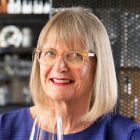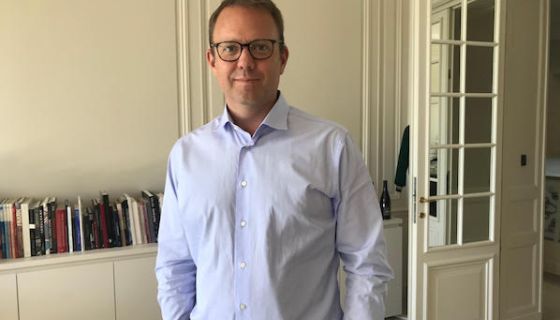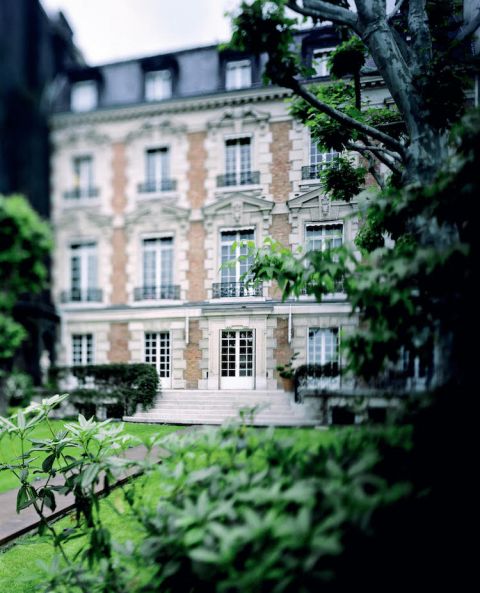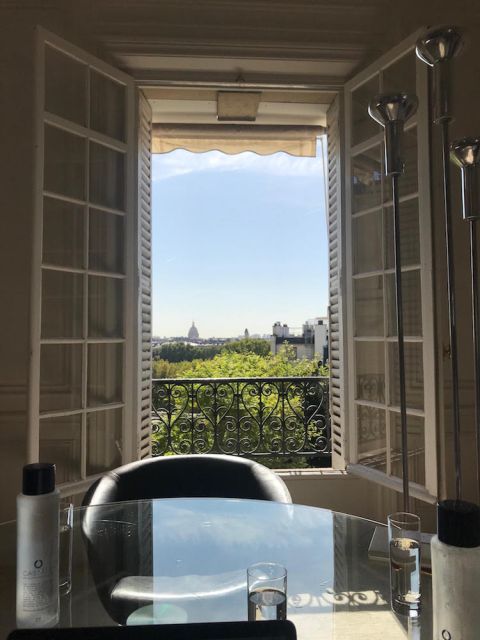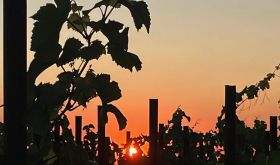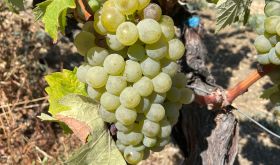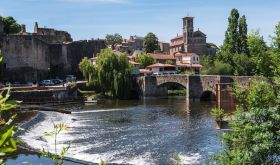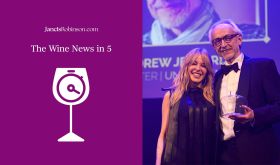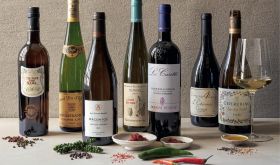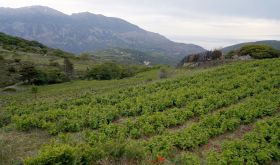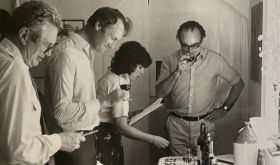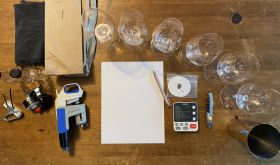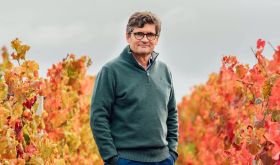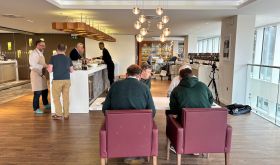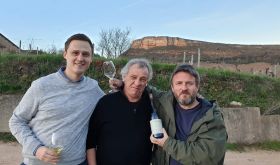A new force in wine is always interesting, particularly if things are done quietly but with obvious attention to quality, authenticity and the long term. I had been wanting to meet Christopher Descours, 45, who runs the privately owned EPI Group, a relatively recent entrant into the wine world, for some time.
He’s not on the regular wine circuit and seems to hover between Paris and New York. It was not easy to pin him down but I finally managed to meet him in his sunny office with its view of Paris including the Eiffel Tower at the top of a handsome, historic hôtel next to the luxurious new Shangri-La Hotel. EPI’s head office was chosen ‘to show the sort of the company we are', as he put it. Below, the building seen from its handsome garden, and the view from Descours' office.
Thanks to a series of acquisitions in the last eight years, EPI now own Charles Heidsieck Champagne, Piper-Heidsieck Champagne, Rare Champagne, Château La Verrerie in the Luberon, a 49% share of respected Rhône négociant Tardieu-Laurent, the most historically significant producer of Brunello di Montalcino Biondi Santi and, most recently, a minority share in UK wine importer Liberty Wines, along with Sogrape of Portugal. Descours is still actively looking for further acquisitions. He tried, for instance, to buy Bordeaux classed-growth Ch Calon Ségur in 2012. ‘But we used the wrong channel’, is how he explains losing out to an insurance group.
He owes everything to his grandfather Jean-Louis Descours, who had built up a group of low- to mid-market stores in France such as Kookaï and added luxury shoe company J M Weston in 1974. The retail chain was eventually sold but Descours the elder decided to concentrate on craftsmanship, adding what are now the 150 Bonpoint stores, a must for oligarchs’ toddlers, along the way. These couture romper suits et al are handmade in a Parisian atelier 200 m from the EPI HQ.
After a few years in finance, Christofer/Christopher (he seems to use both spellings) joined the prosaically named EPI Group in 1999 and took over from his grandfather in 2005. He says now, ‘my role was to decide what to do with cash raised by selling the store group’. They dabble in real estate, ‘though we are more of a seller than a buyer now’, but have moved definitively towards the grape, with La Verrerie, initially acquired back in 1981, being ‘the seed rather than the blossom’.
The grandparents had bought what was then a mixed fruit farm in the dry climate of Provence in 1981 with their eventual retirement in mind. It had some vines, whose produce was sent to the local co-op, but Jean-Louis transformed the property into a full-blown wine estate. Christopher therefore saw the winery being built and ‘always felt linked to wine’.
He argues that the link between their handcrafted shoes and clothes (the women’s luxury shoe business F Pinet and shirtmakers Figaret were added to the EPI Group in 1990 and 2006 respectively) is craftsmanship, but that it was the acquisition of Charles Heidsieck and Piper-Heidsieck in 2011 that shifted the shape of the company wine-wards. Today champagne and wine constitute EPI’s biggest division.
Descours admits that when he bought it, ‘commercially Charles was almost dead, selling only about 100,000 bottles a year – nothing!’ The champagne houses, which share extensive premises outside Reims, had been part of the Rémy Cointreau group, then much more focused on Krug champagne and its spirits portfolio. ‘The company was no longer a maison de champagne but a production site. But we want to give back to the brands, nourish them and rebuild a direct connection with the consumer.’
I take my hat off to Descours and his team because in a remarkably short time they have put ‘Charles’, as it is known, back in the champagne mainstream where it deserves to be, while increasing sales tenfold. Thanks to a succession of top-quality winemakers, the wine has always been good, but it is now much more widely recognised as such.
It is now packaged in a distinctive bottle modelled on the traditional shape, associated with the spectacular chalk caves under a large, well-tended garden in the middle of Reims that also belong to Charles Heidsieck. And the regular Brut non-vintage is generally about seven years old – pretty impressive. Prices have risen concomitantly or, as Descours puts it, ‘we now have the right pricing’. Charles was allotted extra cash in 2018, apparently, expressly because 2018 was recognised as a particularly promising vintage, although it will be many years before we see the direct results; the current vintage is 2008.
Piper was more of a challenge, not least because it had been sold as a bargain champagne in some markets. But now, although the US is the prime target for both brands, apparently (champagne escaped the recent 25% tariff on imports of French wine into the US, because of Bernard Arnault of LVMH’s personal intervention, it is rumoured), Piper is particularly strong in Australia, is being built up in China, and has long been an export brand. The fact that more than 60% of Piper is sold outside Europe was part of the initial attraction for Descours, and he was assured by renowned veteran winemaker Régis Camus that the potential for Piper was there.
The quality of Piper-Heidsieck seems to me to have improved enormously recently, and its prestige cuvée Rare has cunningly been spun off as a separate brand and house, with Camus overseeing it. Descours claims that Piper’s ‘base was strong. It was mostly a question of image. Many critics hadn’t tasted it for a long time so our strategy was “liquid to lips”. We changed a few things with the supply and add a little more reserve wine.’ Piper Essentiel, a Brut with longer age and fashionably lower dosage, was added to the range in 2017.
The EPI group keeps growing. In 2017 they bought emblematic Tuscan wine producer Biondi Santi, focus of much Montalcino gossip owing to family tensions and the longevity of its wines, which means that mature stock is widely dispersed around the world. Descours told me they are keen to buy back older vintages.
Descours described the acquisition as ‘a once-in-a-lifetime opportunity. If there’s another opportunity like this in the next 10 years we’ll be very lucky.’ They don’t mind where they buy. California, Spain, Australia and New Zealand were all mentioned.
And they are definitely thinking long term. ‘How do we accelerate our wine business into sustainable viticulture?’ mused Descours rhetorically. ‘Our own vineyards are sustainably managed, but in Champagne they represent only 10% of our needs, and they are very close to less carefully tended vines.’ One project, with an eye on the looming problem of agricultural labour, is to develop robots for vineyard work, via machines they hope to sell to others.
As I say, an unusually long-term approach, and from an outsider.
Particularly recommended EPI wines
Tardieu-Laurent, Guy Louis 2016 Côtes du Rhône Blanc
£18.75 Hic!
Piper-Heidsieck Brut NV Champagne
£23 Asda, Tesco
Tardieu-Laurent, Cuvée Spéciale 2015 Châteauneuf-du-Pape
£49 Vincognito
Charles Heidsieck, Blanc de Blancs NV Champagne
£65 Sunday Times Wine Club, BBC Good Food Wine Club
Charles Heidsieck 2008 Champagne
£75 The Wine Society
Biondi Santi 2007 Brunello di Montalcino
£130 Harvey Nichols
Charles Heidsieck, Cuvée des Millénaires 2004 Champagne
£142 The Champagne Company, £154 per single bottle The Finest Bubble, and many more
You can find full tasting notes in our tasting notes database and international stockists from Wine-Searcher.com (links to Wine-Searcher can also be found if you open individual tasting notes).
